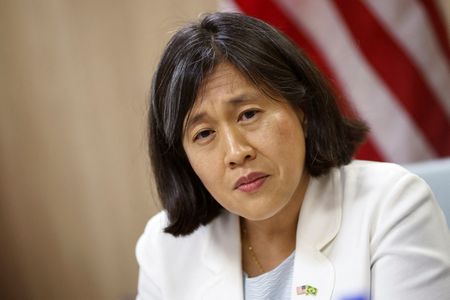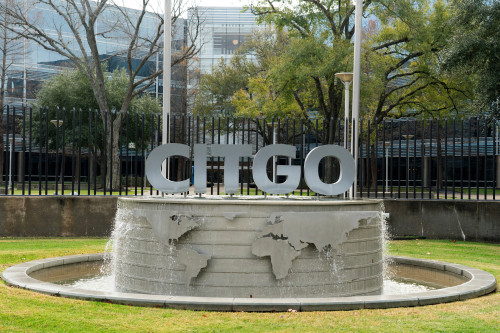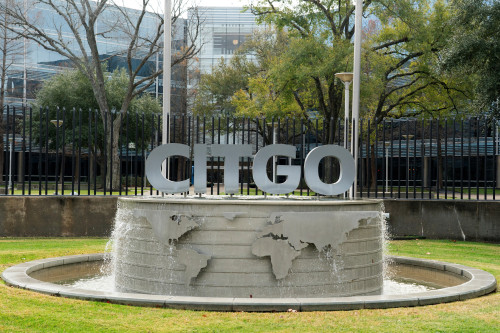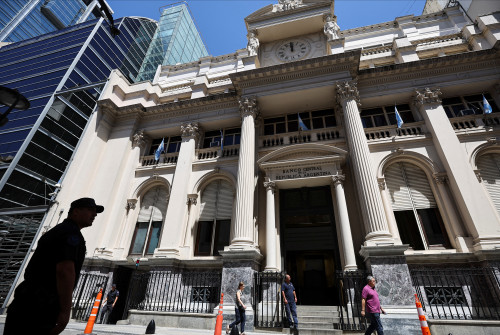By David Lawder
DETROIT (Reuters) – U.S. Trade Representative Katherine Tai on Thursday called on Asia Pacific Economic Cooperation (APEC) trade ministers to “think creatively” for solutions to overcome a host of challenges from fragile supply chains, a worsening climate crisis and growing inequality.
Launching a two-day meeting of the ministers under a cloud of U.S.-China tensions in Detroit, a city that has experienced the negative impact of “aggressive” trade liberalization, she urged them to build on recent World Trade Organization agreements to better serve workers and build trade more sustainably.
“We have an opportunity in APEC to forge a new path for our people and for our planet and to build our economies from the bottom up and the middle out, to deliver tangible results for our people,” Tai said.
As they started, the APEC meetings were already overshadowed by the first meeting between high ranking Washington and Beijing officials for the first time in months in a bid to overcome a cascade of irritants.
Trade experts said subsequent talks on the U.S.-led Indo-Pacific Economic Framework initiative (IPEF) – featuring many of the same APEC ministers, but not China’s – would be a higher priority for U.S. officials.
U.S. Trade Representative Katherine Tai in opening remarks called for APEC ministers to work on reforms to the World Trade Organization.
She asked them to build on multilateral momentum seen in last year’s WTO ministerial meeting that produced the body’s first new agreements in years, including curbs on fishery subsidies and a partial intellectual property waiver on COVID-19 vaccines.
The U.S. has long criticized the WTO for failing to curb China’s state-dominated economic policies.
“We have an opportunity in APEC to forge a new path for our people and for our planet and to build our economies from the bottom up and the middle out, to deliver tangible results for our people,” Tai said.
CHINA MEETINGS
U.S. Commerce Secretary Gina Raimondo is expected to meet with Chinese Commerce Minister Wang Wentao on Thursday, his ministry said. Their conversation in Washington is expected to be followed by a meeting with Tai in Detroit.
The plans, which have not been confirmed by the U.S. agencies, come amid a string of setbacks for U.S. and Chinese efforts to resume dialogue on economic and trade issues, starting with the downing of a Chinese spy balloon in U.S. coastal waters.
These irritants continued through last Sunday, when G7 leaders pledged to resist China’s “economic coercion” and Beijing responded by declaring U.S. memory chip maker Micron Technology a national security risk, banning its sales to key domestic industries.
“It’s significant that China seems now willing to engage at cabinet level,” said Matthew Goodman, senior vice president of economics at the Center for Strategic and International Studies and a former White House official who planned APEC, G20 and other global meetings.
“The weight is on understanding each other’s positions even if they don’t produce tangible outcomes.
INDO-PACIFIC TALKS
Goodman downplayed the APEC conference as likely to produce a “lowest common denominator” statement, and said that the IPEF talks in Detroit on Saturday was likely to produce a more significant result, with an agreement aimed at making supply chains more secure and resilient.
The IPEF talks, to be led by both Tai and Raimondo, are the Biden administration’s major Asian economic initiative, aimed in part to curb China’s influence in the region.
People briefed on the negotiations said that while an agreement on supply chains was likely in Detroit, more difficult discussions covering environmental and labor standards and non-tariff trade barriers, including digital trade rules and agriculture standards, would take longer to achieve.
(Reporting by David Lawder; additional reporting by Joe Cash in Beijing; Editing by Marguerita Choy)





